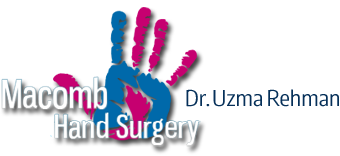Avoiding & Treating Grilling Burn Injuries
For most people, it just wouldn’t 4th of July without burgers and dogs simmering on the grill. And with more than 40% of Michigan adults vaccinated, many families are looking forward to returning to backyard Bar-B-Ques to celebrate!
But anytime there is heat or fire, there is the potential for burns – and grilling outdoors is no exception.
Taking proper precautions beforehand can help prevent the opportunity for serious hand injuries when grilling. So, as you pull out that Weber it is important to keep some important basic safety precautions in mind.
Charcoal & Gas Grill Injury Statistics
According to statistics recently published by disaster remediation specialists SERVPRO, charcoal and gas grills are involved in more than 5,000 structure fires each year. And grilling accidents result in approximately 20,000 trips to the emergency room or hospital every year. With burns to the hands and arms being the most common grilling injury.
FEMA reports that grill fires at homes result in an estimated average of 10 deaths and $37 million in property loss each year- with 57% occurring in the summer months of May through August.
Children and Grill Contact Burns
Grilling “contact burns” occur when someone bumps into, touches or falls on the grill, a part of the grill or hot coals. Sadly, while children are not the ones doing the grilling, children under five account for an average of 2,000 or 38%, of contact burns per year – according to the National Fire Protection Association (NFPA).
So, when grilling, barbecue safety is especially important to keep children away from harm.
How to Prevent Gas Grilling Fires, Burns & Injury
To help prevent burns and other injuries when grilling:
- Clean grill racks and grease trays before starting.
- Check gas tank hoses for leaks at the beginning of the summer and periodically.
- Choose a safe, firm, level spot for the grill away from coolers, awnings & hanging branches.
- Charcoal grills: use a charcoal chimney with newspaper, a charcoal starter fluid, or an electric charcoal starter plugged into an outdoor-rated extension cord.
- Gas grills: open the lid before turning on. If you smell gas after lighting, do NOT move the grill. Move away from the grill and call the fire department.
- Keep children and pets at least four to five feet away from the hot grill. Remember grill surfaces can remain hot for an hour or more.
- Use long-handled grill utensils in good condition.
- Avoid loose, flowing clothing.
- Wear flame-retardant mitts to adjust vents to help prevent burns.
- Keep baking soda within reach to control grease fires.
- Have a fire extinguisher, a garden hose, or a bucket of sand handy to extinguish spark-triggered fires.
- NEVER attempt to move a hot grill.
Treating Grill Burn Injuries
.
Treating Major Grill Burn Injuries
Call 911, or immediately take the adult or child to the nearest ER or Urgent care if the burns are:
- Deep
- Causing skin to look dry and leathery
- Appear charred or have patches of white, brown or black
- Are larger than 3 inches
- Cover the hands, feet, face, groin, buttocks or a major joint
While you are waiting for medical care for a major burn:
- Cover wound with a cool, moist bandage or a clean cloth. (NOT ice)
- Do NOT immerse large severe burns in water.
- Elevate the burned area. Raise the burn above heart level, if possible.
- Watch for signs of shock. (pale complexion, shallow breathing)
Treating Minor Grill Burn Injuries
Typically, a minor burn does NOT require emergency care if the burn:
- Is only superficial redness (looks like a sunburn)
- Blisters but is not deep
- Is no larger than 3 inches in diameter
- But if IN DOUBT seek emergency care
Minor burns can be treated by:
- Cooling the burn by holding the area under cool (not cold) running water or by applying a cool, wet compress until pain eases. (Do NOT apply ice)
- Remove rings or other tight items from the area quickly and gently, before the area swells.
- Do NOT break blisters – they protect against infection.
- If a blister breaks, clean the area with water & mild soap & apply antibiotic ointment.
- Apply a soothing or healing aloe vera or antibiotic lotion (free of cosmetic ingredients, fragrance, etc.) to prevent drying & provide relief.
- Bandage the burn with a sterile gauze bandage (not fluffy cotton). Wrap it loosely to avoid pressure on burned skin.
- If needed, take over-the-counter pain reliever, such as ibuprofen (Advil, Motrin IB, others), naproxen sodium (Aleve) or acetaminophen (Tylenol, others).
Southeast Michigan Hand Specialist
We wish every one of our Southeast Michigan patients a happy and SAFE 4th of July. Remember, taking precautions beforehand when grilling, will help you enjoy this summer holiday while keeping yourself and your loved ones safe!
If you are suffering from an injury or pain in your fingers, wrist, elbow or arm – due to summer fun or any other cause – contact board certified Southwest Michigan hand specialist Doctor Rehman for a comprehensive evaluation and consultation.
As with any injury or medical conditions, early intervention and treatment is the most effective way to prevent complications or long-term damage to the hands or limbs. Doctor Rehman will assess your individual situation and offer the most advanced procedures that are best for your condition.

